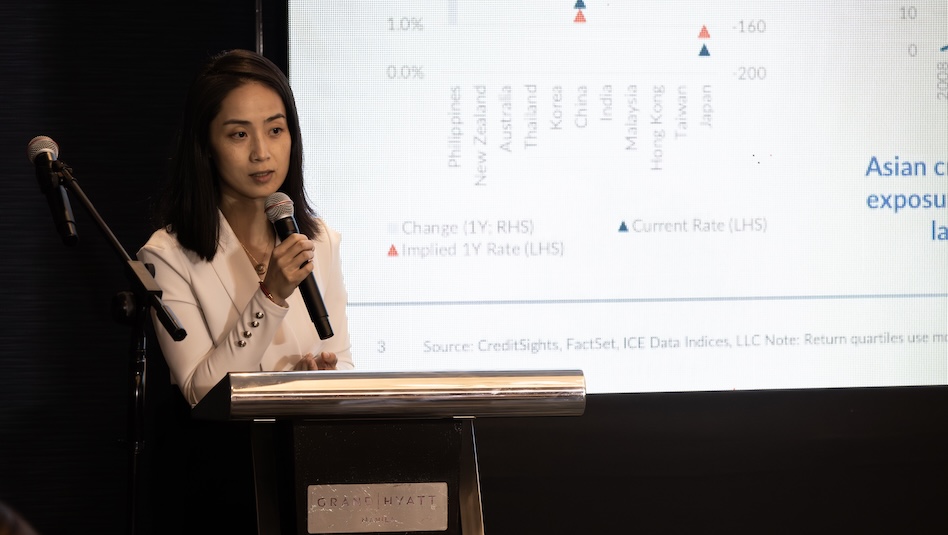Bond Portfolio Strategy in 2025: Stay calm and “carry” on
The macro risks stemming from US trade policies will shape investors’ strategies in 2025. Here are some key insights to consider.

How should you go about crafting your bond portfolio strategy this year?
Zerlina Zeng, Head of Asia Strategy and East Asia Corporates of CreditSights, recommends something simple: stay calm and focus on carry, or the returns you would expect from just holding a bond.
In the recent Market Movements briefing of Metrobank for clients titled “Playing the Trump card: Tariffs and the global economy”, Zeng advocated for a more defensive playbook.
Here are some key takeaways from her talk:
1. Defensive positioning is prudent right now
For Zeng, it is a time to be cautious. One way to do that is to focus on high-quality bonds issued by companies backed by the government, such as those from Korea and other Southeast Asian countries. These can provide reliable income with lower risk.
“We like the clients to stay a bit defensive. We like the South Korean quasi sovereigns. These are the double A rated names, who do have some pick up against the other sovereign part of the Asian credit such as the Chinese SOEs (state-owned enterprises),” said Zeng.
2. Look for “carry” opportunities in high-quality names
Focus on earning steady interest income. Bonds from strong companies offer reasonable yields without too much risk.
“We like the opportunities in the new issues you tie on market coupons. This is especially for the financial-related issues such as some of the East and Southeast Asian financials. If we look at the 5-6% yield bucket, compared to historical all-in yield, this is still quite decent,” she said.
3. Diversification is key in today’s market
Zeng emphasized spreading your investments across different markets. Consider adding bonds from financial institutions from Europe, Japan, and Australia to help reduce overall risk.
“A lot of our clients considered diversification over the past one to two years. Some of the top destinations include the usual suspects – European banks, US IG (investment grade) credits, those well-known names and Japanese and Australian financials,” said Zeng.
4. Be careful with long-term bonds
The recommendation is to keep the average duration of your bond portfolio around five years and avoid aggressively taking positions in long term bonds such as those over 10 years. Interest rate risk and market volatility may impact your portfolio.
Zeng said: “In terms of total portfolio target duration, we are looking at five years. So that’s slightly below the index level. But we will recommend against aggressively adding duration, because if there is aggressive movement at the long end of the US Treasury curve, longer duration bonds tend to underperform.”
5. Stay invested but stay selective
Sometimes the headlines may appear alarming. Zeng believes there is no need to panic. Resilience has been a key trait of Asian bond markets. It is about being more deliberate with what you invest in.
“For the high beta (i.e. more volatile) ones, in the corporate space, we like some of the IG India names, some of the Philippine names, and the high-rated Hong Kong and China property. These are some of the A category names. I think there is going to be a lot of volatility ahead. So clients need to diversify across in the Asian hard currency (i.e., US dollar) credit space,” she said.
Investment-grade (IG) corporate bonds currently have the tightest credit spreads, as yield differences with these bonds and risk-free government bonds are narrow, making them more expensive.
As such, Zeng advises investors to consider holding bonds with shorter maturity periods, being more selective with choosing these bonds, and diversification of investments. Diversifying into local currency bond markets (i.e., peso government bonds) may also be prudent for Filipino investors.
“The overall message,” said Zeng, “is keep calm, do not panic, and carry on.”
If you wish to watch Zeng’s presentation, just click here and skip to the 6:39 mark.
(Disclaimer: This is general investment information only and does not constitute an offer or guarantee, with all investment decisions made at your own risk. The bank takes no responsibility for any potential losses. You may consult your relationship manager or investment specialist for proper investment advice.)
EARL ANDREW “EA” AGUIRRE is the Head of the Investment Counselor Department under the Financial Markets Sector of Metrobank. He has more than a decade of experience in foreign exchange, fixed income securities, and derivatives sales. He has a Master’s in Business Administration from the Ateneo Graduate School of Business. His interests include regularly traveling to Japan and learning its language and culture.







 DOWNLOAD
DOWNLOAD




 By Earl Andrew A. Aguirre
By Earl Andrew A. Aguirre